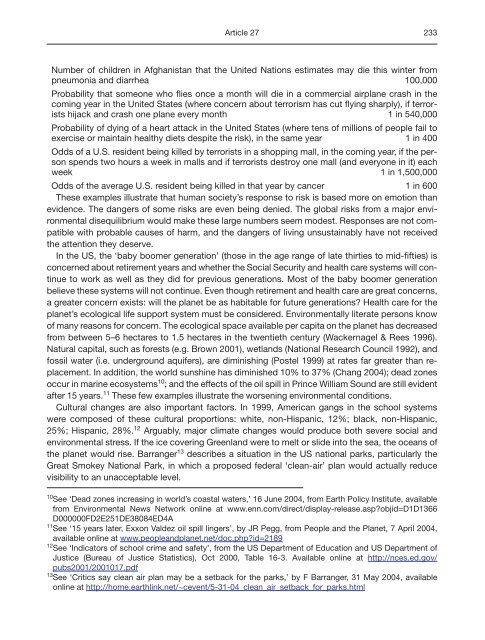View - ResearchGate
View - ResearchGate
View - ResearchGate
You also want an ePaper? Increase the reach of your titles
YUMPU automatically turns print PDFs into web optimized ePapers that Google loves.
Article 27233Number of children in Afghanistan that the United Nations estimates may die this winter frompneumonia and diarrhea 100,000Probability that someone who flies once a month will die in a commercial airplane crash in thecoming year in the United States (where concern about terrorism has cut flying sharply), if terroristshijack and crash one plane every month 1 in 540,000Probability of dying of a heart attack in the United States (where tens of millions of people fail toexercise or maintain healthy diets despite the risk), in the same year 1 in 400Odds of a U.S. resident being killed by terrorists in a shopping mall, in the coming year, if the personspends two hours a week in malls and if terrorists destroy one mall (and everyone in it) eachweek 1 in 1,500,000Odds of the average U.S. resident being killed in that year by cancer 1 in 600These examples illustrate that human society’s response to risk is based more on emotion thanevidence. The dangers of some risks are even being denied. The global risks from a major environmentaldisequilibrium would make these large numbers seem modest. Responses are not compatiblewith probable causes of harm, and the dangers of living unsustainably have not receivedthe attention they deserve.In the US, the ‘baby boomer generation’ (those in the age range of late thirties to mid-fifties) isconcerned about retirement years and whether the Social Security and health care systems will continueto work as well as they did for previous generations. Most of the baby boomer generationbelieve these systems will not continue. Even though retirement and health care are great concerns,a greater concern exists: will the planet be as habitable for future generations? Health care for theplanet’s ecological life support system must be considered. Environmentally literate persons knowof many reasons for concern. The ecological space available per capita on the planet has decreasedfrom between 5–6 hectares to 1.5 hectares in the twentieth century (Wackernagel & Rees 1996).Natural capital, such as forests (e.g. Brown 2001), wetlands (National Research Council 1992), andfossil water (i.e. underground aquifers), are diminishing (Postel 1999) at rates far greater than replacement.In addition, the world sunshine has diminished 10% to 37% (Chang 2004); dead zonesoccur in marine ecosystems 10 ; and the effects of the oil spill in Prince William Sound are still evidentafter 15 years. 11 These few examples illustrate the worsening environmental conditions.Cultural changes are also important factors. In 1999, American gangs in the school systemswere composed of these cultural proportions: white, non-Hispanic, 12%; black, non-Hispanic,25%; Hispanic, 28%. 12 Arguably, major climate changes would produce both severe social andenvironmental stress. If the ice covering Greenland were to melt or slide into the sea, the oceans ofthe planet would rise. Barranger 13 describes a situation in the US national parks, particularly theGreat Smokey National Park, in which a proposed federal ‘clean-air’ plan would actually reducevisibility to an unacceptable level.10 See ‘Dead zones increasing in world’s coastal waters,’ 16 June 2004, from Earth Policy Institute, availablefrom Environmental News Network online at www.enn.com/direct/display-release.asp?objid=D1D1366D000000FD2E251DE38084ED4A11 See ‘15 years later, Exxon Valdez oil spill lingers’, by JR Pegg, from People and the Planet, 7 April 2004,available online at www.peopleandplanet.net/doc.php?id=218912 See ‘Indicators of school crime and safety’, from the US Department of Education and US Department ofJustice (Bureau of Justice Statistics), Oct 2000, Table 16-3. Available online at http://nces.ed.gov/pubs2001/2001017.pdf13 See ‘Critics say clean air plan may be a setback for the parks,’ by F Barranger, 31 May 2004, availableonline at http://home.earthlink.net/~cevent/5-31-04_clean_air_setback_for_parks.html















